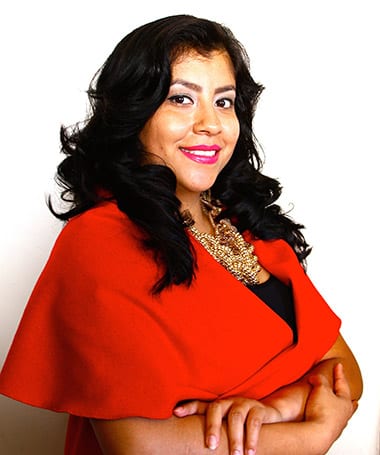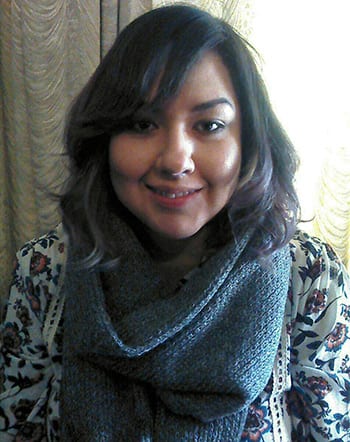By Andrew Cohen
Evelyn Rangel-Medina ’16 and Lupe Aguirre ’16 have plenty in common: A profound commitment to social justice, a passion for protecting immigrant communities, a stellar list of achievements—and now Berkeley Law’s Francine Diaz Memorial Award.
The annual award recognizes graduating women of color who have displayed exceptional dedication to social justice issues. It honors Francine Diaz, a Class of 1987 member who served the disadvantaged before being killed in a car accident the summer after her first year of law school. Fanna Gamal ’16 and Stephanie Llanes ’16 won honorable mention for their outstanding social justice work.
Believing in justice—and herself

As long as she can remember, Rangel-Medina ’16 has seen “members of my community exploited, marginalized, and scapegoated. I really wanted to transform that.”
She came to the United States from Mexico at age six, enrolling in “a mostly segregated and under-resourced school system that offered its mostly low-income, Mexican-American students very few pathways to success.” As a high school junior, Rangel-Medina read about Thurgood Marshall in history class—and decided to pursue law school.
“I didn’t know anything about applying to college,” she said. “It just wasn’t part of our world. But I enrolled in community college, transferred to the University of Nevada-Las Vegas (UNLV), started working on issues I cared about, and steadily built more confidence.”
Despite working full-time to finance her education and sustain her family, Rangel-Medina was named UNLV’s Outstanding Graduating Senior and won several other national awards and scholarships. She also founded the school’s Alliance of Student Organizations of Color and the United Coalition for Immigrant Rights—a group of more than 30 organizations that works to stop anti-immigrant measures locally and advance immigration reform nationally.
After graduating, Rangel-Medina became policy director for the Ella Baker Center for Human Rights’ Green-Collar Jobs Campaign and helped enact legislation that created a multi-million-dollar annual investment fund for communities most impacted by poverty and pollution. She then co-founded a consulting firm, steering a multistate anti-private prison initiative.
At Berkeley Law, she continued working to support her family—while diving into social justice causes. A mere sampling: co-chair of the Coalition for Diversity, volunteer with the Deferred Action for Childhood Arrivals Clinic, and board member of the La Raza Law Student Association and Women of Color Collective. Last year, she earned an American Jurisprudence Award and completed a federal judicial externship.
“In my community, there’s an unparalleled work ethic and commitment to exit poverty and access higher education, but also immense structural barriers that impede it,” she said. “That’s why I try to eliminate these barriers by working with communities that need it the most and by connecting with people who have a similar experience to that of my family. Berkeley is a great place to do that because it aims to value the experiences of first-generation students and students of color.”
For the International Human Rights Law Clinic (IHRLC), Rangel-Medina co-wrote a report on the implications of the subminimum wage ($2.13 an hour) earned by “tipped” restaurant workers. That led to a part-time job at the Restaurant Opportunities Center—working to improve industry conditions and increase the minimum wage—which she will join full-time this fall.
“Representing and organizing restaurant workers covers many in need—poor people, immigrants, people of color, women experiencing sexual harassment,” she said. “You can’t address their situation only from a poverty perspective. The issues span race, gender, class, immigration status, gender identity and sexuality, which means effective solutions can uplift many communities.”
Following her parents’ example

For Lupe Aguirre, social justice is in her family’s DNA. Her immigrant parents volunteered regularly with charitable organizations, and helped inmates at the local county jail. “Even though my parents never finished grade school, I had two great examples who instilled a duty to use my education to help people less privileged,” Aguirre said. “That’s why I applied to law school, and why I chose Berkeley.”
A “huge believer” in the school’s clinical and field placement programs, Aguirre took full advantage of her opportunities. She went to Geneva last year with the international clinic on behalf of a coalition advocating for poor communities that lacked access to clean water.
“I got to chase down U.N. diplomats and discuss how the United States can best fulfill its human right obligations in this area,” said Aguirre, who prepared a successful hearing request before the Inter-American Commission on Human Rights and co-drafted a report on the human right to water. “That was really memorable.”
The field placement program enabled her to work at the National Immigration Law Center, where she drafted legal memos and amicus briefs and partnered with local organizations to promote pro-immigrant laws and policies.
“Going to Sacramento to talk with policymakers, attending hearings, and giving testimony were hugely valuable in building my skill set,” she said. “Being exposed to non-litigation strategies is crucial for any social justice advocate.”
Before law school, Aguirre spent five years as a case manager at the Immigration Center for Women and Children—interfacing with law enforcement and social service providers, while advocating for clients’ legal benefits. She also liaised with the Mexican consulate to obtain referrals and funding.
“Much of my work has focused on enforcement,” said Aguirre, who spent the past two summers working for the ACLU of Southern California Immigrants’ Rights Project and part of one summer at the Esperanza Immigrant Rights Project. “Fighting for the rights of people facing deportation, writing demand letters for detainees, representing children and those with mental disabilities facing deportation.”
Other social justice outlets at Berkeley Law included the Immigration Group Detention Center Clinic, Workers’ Rights Disability Law Clinic, and Berkeley Law Raza Law Journal. This fall, Aguirre will begin a two-year Justice Corps Fellowship in New York City—continuing her immigration work.
“Immigrants are some of our country’s most vulnerable yet powerful people,” she said. “Not always politically powerful, but definitely powerful in their ability to overcome draconian laws and policies. I come from a family of immigrants, and I’m proud to work on their behalf.”